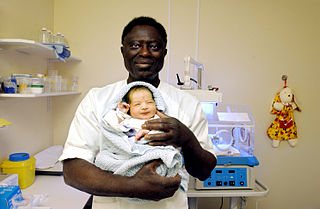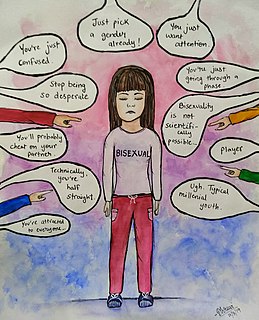
A gender role, also known as a sex role, is a social role encompassing a range of behaviors and attitudes that are generally considered acceptable, appropriate, or desirable for a person based on that person's sex. Gender roles are usually centered on conceptions of masculinity and femininity, although there are exceptions and variations. The specifics regarding these gendered expectations may vary substantially among cultures, while other characteristics may be common throughout a range of cultures.

Biphobia is aversion toward bisexuality and bisexual people as individuals. It is a form of homophobia against those in the bisexual community. It can take the form of denial that bisexuality is a genuine sexual orientation, or of negative stereotypes about people who are bisexual. Other forms of biphobia include bisexual erasure.

Infidelity is a violation of a couple's emotional and/or sexual exclusivity that commonly results in feelings of anger, sexual jealousy, and rivalry.
Psychological abuse, often called emotional abuse, is a form of abuse characterized by a person subjecting or exposing another person to behaviour that may result in psychological trauma, including anxiety, chronic depression, or post-traumatic stress disorder. It is often associated with situations of power imbalance in abusive relationships, and may include bullying, gaslighting, and abuse in the workplace. It also may be perpetrated by persons conducting torture, other violence, acute or prolonged human rights abuse, particularly without legal redress such as detention without trial, false accusations, false convictions, and extreme defamation such as where perpetrated by state and media.

Lesbian feminism is a cultural movement and critical perspective that encourages women to focus their efforts, attentions, relationships, and activities towards their fellow women rather than men, and often advocates lesbianism as the logical result of feminism. Lesbian feminism was most influential in the 1970s and early 1980s, primarily in North America and Western Europe, and arose out of dissatisfaction with the New Left and the Campaign for Homosexual Equality.
Feminist theory is the extension of feminism into theoretical, fictional, or philosophical discourse. It aims to understand the nature of gender inequality. It examines women's and men's social roles, experiences, interests, chores, and feminist politics in a variety of fields, such as anthropology and sociology, communication, media studies, psychoanalysis, political theory, home economics, literature, education, and philosophy.

Femicide or feminicide is a hate crime term, broadly defined as "the intentional killing of women or girls because they are female", though definitions vary depending on its cultural context. Feminist author Diana E. H. Russell was the first person to define and disseminate this term in modern times, in 1976. She defines the word as "the killing of females by males because they are female." Other feminists place emphasis on the intention or purpose of the act being directed at females specifically because they are female. Others include the killing of females by females.
Michael G. Flood is an Australian sociologist and an associate professor at the Queensland University of Technology School of Justice. Flood gained his doctorate in gender and sexuality studies from the Australian National University. His areas of research are on violence against women, fathering, pro-feminism, domestic violence, the effects of pornography on young people, safe sex among heterosexual men, men's movements as a backlash to the feminist movement, men's relationships with each other and with women, homophobia, men's health, and gender justice. He is a regular contributor to and is regularly quoted in the media on these and other issues.
Feminist sexology is an offshoot of traditional studies of sexology that focuses on the intersectionality of sex and gender in relation to the sexual lives of women. Sexology has a basis in psychoanalysis, specifically Freudian theory, which played a big role in early sexology. This reactionary field of feminist sexology seeks to be inclusive of experiences of sexuality and break down the problematic ideas that have been expressed by sexology in the past. Feminist sexology shares many principles with the overarching field of sexology; in particular, it does not try to prescribe a certain path or "normality" for women's sexuality, but only observe and note the different and varied ways in which women express their sexuality. It is a young field, but one that is growing rapidly.

Intimate partner violence (IPV) is domestic violence by a current or former spouse or partner in an intimate relationship against the other spouse or partner. IPV can take a number of forms, including physical, verbal, emotional, economic and sexual abuse. The World Health Organization (WHO) defines IPV as "any behaviour within an intimate relationship that causes physical, psychological or sexual harm to those in the relationship, including acts of physical aggression, sexual coercion, psychological abuse and controlling behaviors." IPV is sometimes referred to simply as battery, or as spouse or partner abuse.
Domestic violence occurs across the world, in various cultures, and affects people across society, at all levels of economic status; however, indicators of lower socioeconomic status have been shown to be risk factors for higher levels of domestic violence in several studies. In the United States, according to the Bureau of Justice Statistics in 1995, women reported a six times greater rate of intimate partner violence than men. However, studies have found that men are much less likely to report victimization in these situations.

Domestic violence is violence or other abuse that occurs in a domestic setting, such as in a marriage or cohabitation. Domestic violence is often used as a synonym for intimate partner violence, which is committed by one of the people in an intimate relationship against the other person, and can take place in either heterosexual or same-sex relationships or between former spouses or partners. In its broadest sense, domestic violence also involves violence against children, parents, or the elderly. It can assume multiple forms, including physical, verbal, emotional, economic, religious, reproductive, or sexual abuse. It can range from subtle, coercive forms to marital rape and other violent physical abuse, such as choking, beating, female genital mutilation, and acid throwing that may result in disfigurement or death, and includes the use of technology to harrass, monitor, stalk or control. Domestic murder includes stoning, bride burning, honor killing, and dowry death, which sometimes involves non-cohabitating family members.
Domestic violence against men deals with domestic violence experienced by men in a domestic setting, such as in marriage or cohabitation. As with domestic violence against women, violence against men may constitute a crime, but laws vary between jurisdictions.
Compulsory heterosexuality is the theory that heterosexuality is assumed and enforced upon women by a patriarchal and heteronormative society. The term was popularized by Adrienne Rich in her 1980 essay titled "Compulsory Heterosexuality and Lesbian Existence". According to Rich's theory, women in every culture are believed to have an innate preference for relationships with men and this leads women to devalue and minimize the importance of their relationships with other women; she suggests that women are socialized to identify with males and to cast their "social, political, and intellectual allegiances" with them, and are discouraged from identifying with other females.
Media and gender refers to the relationship between mass media and gender, and how gender is represented within media platforms. These platforms include but are not limited to film, radio, television, advertisement, social media, and video games. Initiatives and resources exist to promote gender equality and reinforce women's empowerment in the media industry and representations. For example, UNESCO, in cooperation with the International Federation of Journalists, elaborated the Gender-sensitive Indicators for Media contributing to gender equality and women's empowerment in all forms of media.
Domestic violence within lesbian relationships is the pattern of violent and coercive behavior in a female same-sex relationship wherein a lesbian or other non-heterosexual woman seeks to control the thoughts, beliefs, or conduct of her female intimate partner. In the case of multiple forms of domestic partner abuse, it is also referred to as lesbian battering.
The feminist pathways perspective is a feminist perspective of criminology which suggests victimization throughout the life course is a key risk factor for women's entry into offending.

Domestic violence in same-sex relationships is a pattern of violence or abuse that occurs within same-sex relationships. Domestic violence is an issue that affects people of any sexuality, but there are issues that affect victims of same-sex domestic violence specifically. These issues include homophobia, internalized homophobia, HIV and AIDS stigma, STD risk and other health issues, lack of legal support, and the violence they face being considered less serious than heterosexual domestic violence. Moreover, the issue of domestic violence in same-sex relationships has not been studied as comprehensively as domestic violence in heterosexual relationships. However, there are legal changes being made to help victims of domestic violence in same-sex relationships, as well as organizations that cater specifically to victims of domestic violence in same-sex relationships.
Patrice Buzzanell is a distinguished professor at the Brian Lamb School of Communication at Purdue University. She focuses on organization communication with a feminist viewpoint. A majority of the research Dr. Buzzanell has completed is geared towards how everyday interactions, identities, and social structures can be affected by the intersections of gender. She researches how these dynamics can impact overall practices, decisions, and results in the workplace, and more specifically, in the STEM field work environments.
Irene Hanson Frieze is a personality psychologist and pioneering figure in the field of women's studies. She is known for her research on intimate partner violence in marriage and dating relationships, and for cross-cultural studies of attitudes about work and gender roles. Frieze is Professor Emerita of Psychology and Women's Studies at the University of Pittsburgh.







